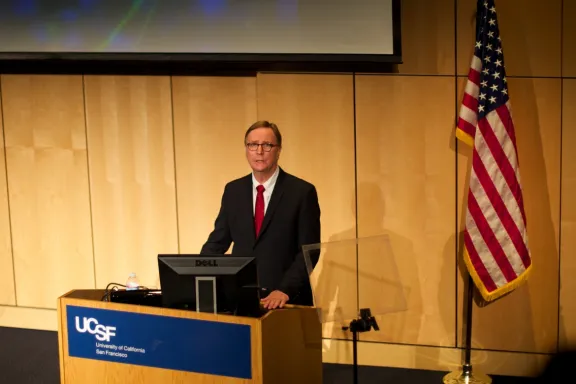
Chancellor Hawgood Emphasizes Community Partnerships in his State of the University Address
“Universities in America are at a hinge of history – while connected to the past, they are swinging in new directions,” said newly appointed UCSF Chancellor Sam Hawgood, MBBS, to a packed Cole Hall, quoting Clark Kerr, the first chancellor of UC Berkeley in the 1960s. This was true of UCSF in the sixties, and this is still true today. We must be “receptive to change and willing to swing in new directions” while remaining true to our core values. These new directions, said Hawgood, would focus on creating partnerships with the community and developing new technologies in teaching and in patient care, to “more directly and rapidly translate new knowledge into the human good.”
UCSF’s solid foundation
UCSF already has “a remarkable foundation upon which to build,” Hawgood remarked. UCSF was the top public recipient of NIH funding in the country, and the university continues to expand its programs, by opening the Global Health and Clinical Sciences building and in February the UCSF Medical Center at Mission Bay. Additionally, while more than 20,000 donors donated 445 million dollars to UCSF in the last fiscal year, a record for the University of California system, he named as a high priority his plans to grow the university’s endowment in the years to come.
A leader in the community
Hawgood emphasized that UCSF must be a “leader and convener for the many elements that make the Bay Area so special,” stressing that partnerships across all of UCSF’s missions will be executed during his chancellorship, giving as examples UCSF’s partnership with Google to create a platform to predict where malaria is transmitted, as well as a partnership with Children’s Hospital Oakland.
To maintain its status as a leader, UCSF must also continue to address its missions in research, education, and patient care. Regarding research, Hawgood said that he plans to “devote all necessary personal time and attention” to keep UCSF “eminent in all the basic sciences.” He prioritized the building of UCSF’s “precision medicine platform,” citing as an example partnerships with Syapse and DNAnexus to integrate next generation genomic profiling and cancer care. He also stressed the importance of becoming leaders in the “merging of technologic and biologic sciences,” mentioning his plans to solidify such UCSF programs as the Center for Digital Health Innovation and the Institute for Computational Health Sciences.
In order to remain a leader in health sciences, UCSF must also continue to develop its educational programs. “Our students are digitally savvy and very open to new ways to learn,” he said. Hawgood desires for UCSF to lead in convening a summit focusing on health science education, the goal being to move from “traditional to transformational educational models.”
Hawgood also discussed UCSF’s exciting plans for change in patient care, resulting in a “transformation of our clinical programs” in the form of UCSF Health, which he said would “unite our physicians, nurses, pharmacists, dentists, and other allied health staff with our leaders and management of our hospitals and clinics and, importantly, with multiple community partners” in an aligned organization to deliver health care to large populations at reduced costs. The strategies to pursue this were threefold: to increase patient access to “destination programs” such as cancer care and organ transplants; to train all faculty, staff, and students in skills of “process improvement” to reduce the cost of health care; and to partner with other like-minded health care organizations to form an “Accountable Care Organization.”
Increasing diversity at UCSF
Awarded the 2014 Higher Education Award of Excellence in Diversity, UCSF has been recognized for its diverse student body, but Hawgood aims to increase the diversity of UCSF’s postgraduates, faculty, and leadership. To stress the importance of this, he again quoted Kerr, declaring that “it is the social alchemy that gives special character to an institution.” He closed his speech with this sentiment: “After three decades at UCSF, I believe our social alchemy of inclusion, collaboration, excellence, and dedication to our public mission is very special, and something I will work to preserve at all costs. “



